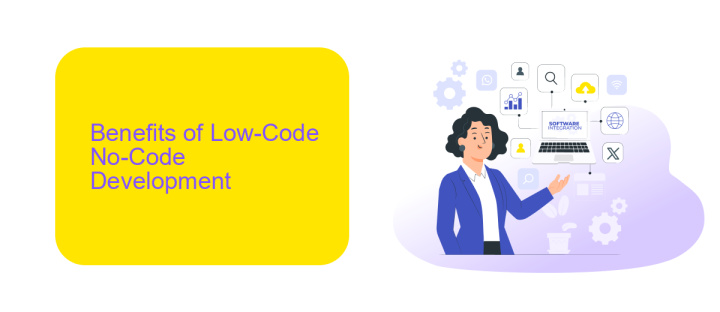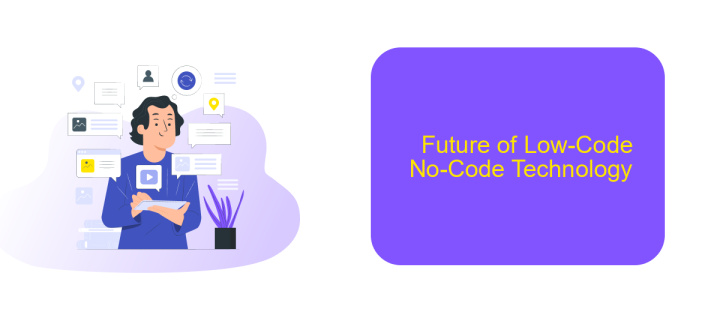Low-Code No-Code Companies
In today's rapidly evolving digital landscape, Low-Code No-Code (LCNC) platforms are revolutionizing the way businesses develop software. These innovative solutions enable companies to create applications quickly and efficiently without requiring extensive coding knowledge. By empowering non-technical users, LCNC platforms are democratizing software development, fostering innovation, and accelerating time-to-market for new products and services.
Introduction to Low-Code No-Code Companies
Low-code and no-code companies are transforming the way businesses develop software by enabling users to create applications with minimal or no coding experience. These platforms provide intuitive visual interfaces, drag-and-drop features, and pre-built templates, making software development accessible to a broader audience.
- Reduced development time and cost
- Empowered non-technical users
- Increased agility and innovation
One notable service in this space is ApiX-Drive, which simplifies the integration of various applications without requiring extensive coding knowledge. By leveraging such platforms, organizations can streamline their workflows, enhance productivity, and quickly adapt to changing business needs. As a result, low-code and no-code companies are becoming increasingly popular across various industries.
Benefits of Low-Code No-Code Development

Low-code and no-code development platforms offer numerous benefits, making them increasingly popular among businesses of all sizes. One of the primary advantages is the significant reduction in development time. By utilizing visual interfaces and pre-built components, these platforms allow users to create applications much faster than traditional coding methods. This accelerates time-to-market, enabling companies to respond swiftly to market demands and stay competitive. Additionally, the reduced need for extensive coding expertise means that a wider range of employees, including those without technical backgrounds, can contribute to the development process, fostering greater collaboration and innovation within teams.
Another key benefit is the cost-efficiency associated with low-code and no-code platforms. Traditional software development often requires substantial investment in skilled developers and extended project timelines. In contrast, low-code and no-code solutions can significantly cut down on these costs. Moreover, these platforms often come with built-in integration capabilities, such as ApiX-Drive, which streamline the process of connecting various systems and services. This not only simplifies the integration process but also enhances the overall functionality of the applications created. As a result, businesses can achieve more with fewer resources, optimizing both their time and budget.
Challenges and Limitations of Low-Code No-Code Platforms

Low-code and no-code platforms offer numerous benefits, but they are not without challenges and limitations. These platforms can sometimes fall short in meeting the specific needs of complex and highly customized projects, leading to potential issues for businesses.
- Limited Customization: While these platforms are designed to be user-friendly, they may lack the flexibility required for highly specialized applications.
- Scalability Issues: As businesses grow, the limitations of low-code and no-code platforms can become apparent, making it difficult to scale applications efficiently.
- Integration Challenges: Integrating with existing systems and third-party services can be problematic. However, services like ApiX-Drive can help streamline these integrations.
- Security Concerns: These platforms may not always offer robust security features, which can be a significant drawback for sensitive applications.
- Dependency on Vendor: Businesses can become heavily reliant on the platform provider, which may pose risks if the vendor changes its policies or discontinues the service.
In summary, while low-code and no-code platforms democratize software development and speed up the development process, businesses must carefully consider their limitations. Evaluating these platforms against specific project requirements and potential future needs is crucial for long-term success.
Future of Low-Code No-Code Technology

The future of low-code and no-code technology is poised to revolutionize the way businesses develop and deploy software applications. As these platforms become more sophisticated, they will empower a broader range of users, from professional developers to non-technical staff, to create and manage applications with ease. This democratization of software development will lead to increased innovation and efficiency across industries.
One of the key trends in the future of low-code and no-code technology is the integration of artificial intelligence and machine learning. These advancements will enable platforms to offer more intelligent automation and predictive analytics, further simplifying the development process. Additionally, the rise of API-driven services will enhance the capabilities of low-code and no-code platforms, allowing for seamless integration with existing systems.
- Enhanced AI and machine learning capabilities
- Greater emphasis on API-driven services
- Improved user experience and interface design
- Increased focus on security and compliance
Services like ApiX-Drive are already paving the way by offering powerful tools for integrating various applications without the need for extensive coding knowledge. As the technology continues to evolve, we can expect even more robust solutions that will make software development more accessible and efficient for everyone.
- Automate the work of an online store or landing
- Empower through integration
- Don't spend money on programmers and integrators
- Save time by automating routine tasks
Key Players in the Low-Code No-Code Market
The Low-Code No-Code market has seen significant growth, with several key players emerging as leaders in the industry. Among these, Microsoft Power Apps stands out for its robust platform that allows users to create custom applications with minimal coding. Another major player, OutSystems, offers a comprehensive suite of tools designed to accelerate application development and deployment. Mendix, a Siemens company, also plays a crucial role by providing a versatile platform that supports a wide range of business needs.
Additionally, ApiX-Drive has become a notable name in the integration space, offering a user-friendly service that simplifies the process of connecting various applications and automating workflows. This platform is especially beneficial for businesses looking to streamline their operations without extensive coding knowledge. Other significant contributors include Appian, known for its low-code automation capabilities, and Betty Blocks, which emphasizes ease of use and rapid development. Together, these companies are driving innovation and making technology more accessible to a broader audience.
FAQ
What is Low-Code/No-Code development?
Who can benefit from Low-Code/No-Code platforms?
How secure are applications built on Low-Code/No-Code platforms?
Can Low-Code/No-Code platforms integrate with other systems?
What are the limitations of Low-Code/No-Code platforms?
Time is the most valuable resource for business today. Almost half of it is wasted on routine tasks. Your employees are constantly forced to perform monotonous tasks that are difficult to classify as important and specialized. You can leave everything as it is by hiring additional employees, or you can automate most of the business processes using the ApiX-Drive online connector to get rid of unnecessary time and money expenses once and for all. The choice is yours!


